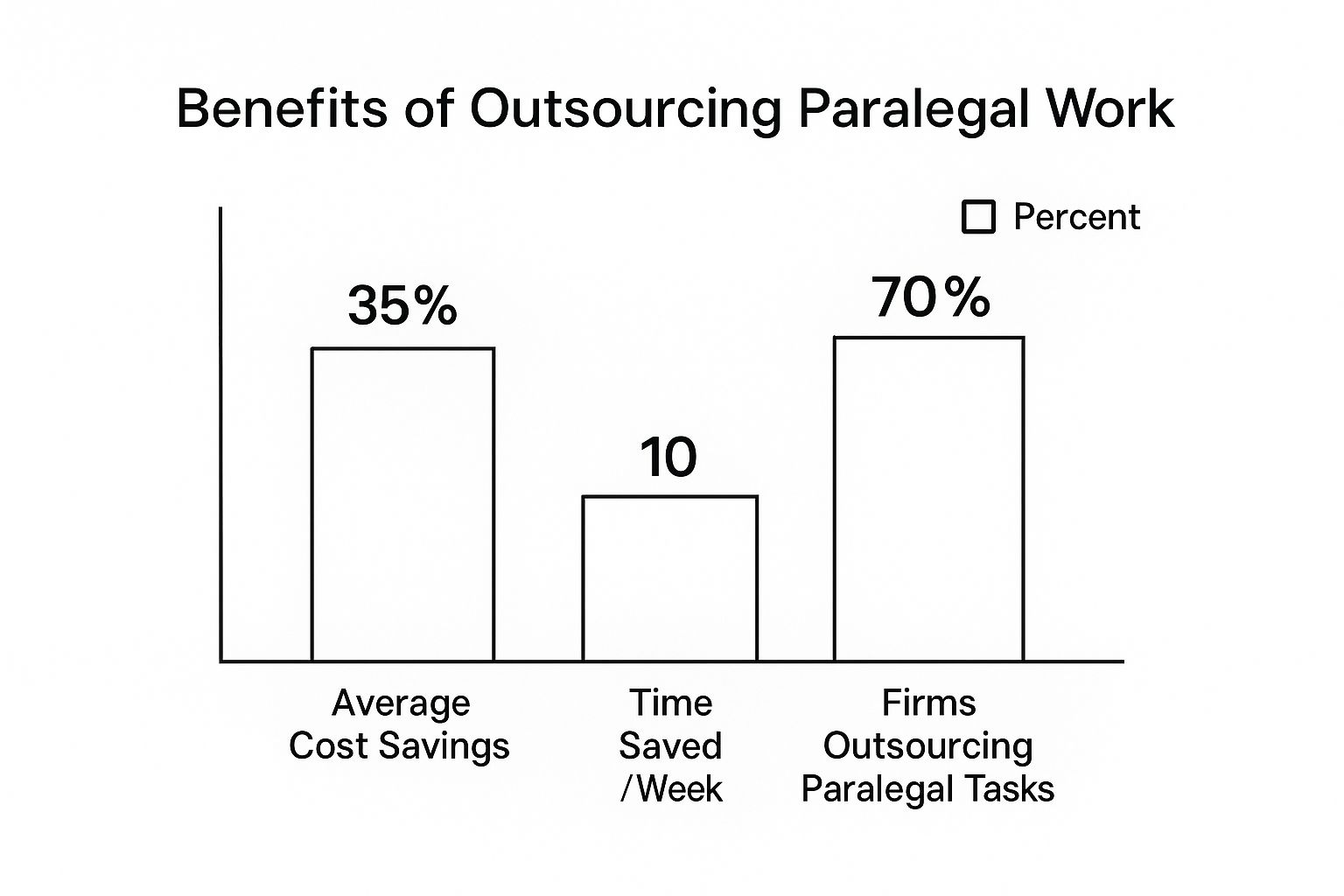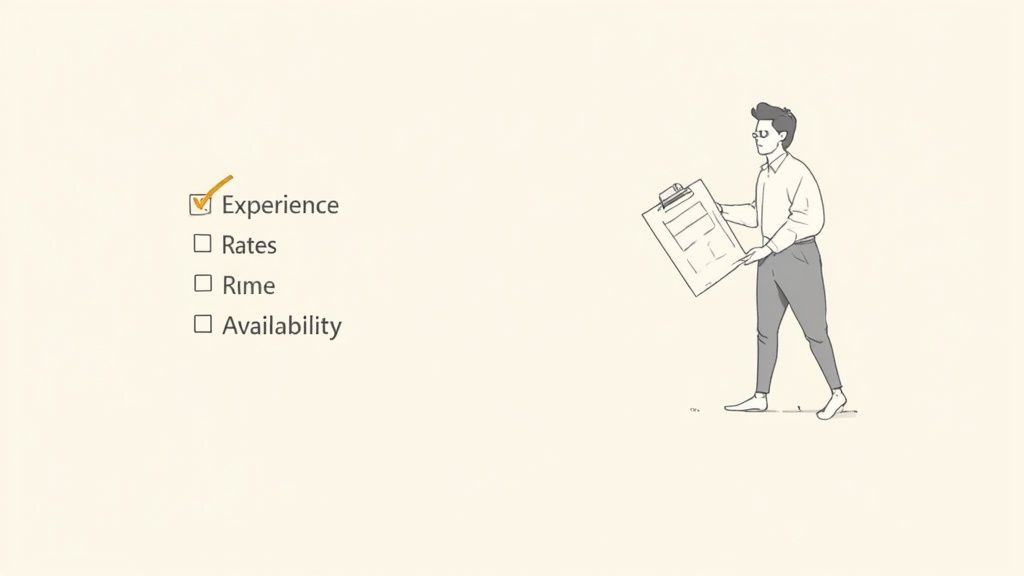
 23 minutes read
23 minutes read
Let’s be real. You’re drowning in document review, your best attorneys are stuck on admin tasks, and the thought of adding another full-time salary to the payroll gives you acid reflux. This is the exact moment when smart law firms stop treading water and start thinking differently. It's time to talk about freelance paralegal services.
This isn’t about pinching pennies. It’s a strategic shift in how you operate, designed for actual growth and profitability.
Ever take a hard look at your payroll and wonder where the hell the money is actually going? It’s a brutal question. You hired talented lawyers to practice law, not to spend their afternoons formatting discovery responses or chasing down signatures. But in way too many firms, that's the grim reality.
The old-school "we do everything in-house" model feels safe, but it's a trap. It locks you into a rigid structure where your most expensive people—your lawyers—are forced to handle low-value, non-billable work. It’s the operational equivalent of using a surgical scalpel to open a cardboard box. Pointless.

You're not just paying an attorney's salary for them to do paralegal work; you're actively losing the revenue they could have been generating. It's a painful one-two punch to your bottom line.
This isn't some business school hypothetical. It’s the bottleneck that’s silently draining your firm's resources. When you see your top legal minds burning through billable hours on tasks a skilled paralegal could knock out more efficiently, you've found the leak. Plugging it is how you build a leaner, meaner practice.
Forget the generic advice. The signs you need freelance help are specific, painful, and probably hitting a little too close to home right now.
Making this strategic shift is becoming the new normal as the U.S. legal services market, valued at around USD 292 billion, keeps growing. Projections show it could hit approximately USD 466 billion by 2034, largely because firms are adopting smarter tech and more flexible staffing. You can get more details about the legal services market trajectory and what it means for you.
The data below shows the real-world benefits firms see when they finally make the switch.

The numbers don't lie: major cost savings, reclaimed attorney time, and widespread adoption prove this isn't some fleeting trend. It's the new standard for running an efficient modern law firm. Exploring the different legal outsourcing services available can help you figure out exactly where to start.
When you're weighing your options, it’s easy to get stuck on just the hourly rate. But the true cost—and value—goes way deeper. Let's get real about what you're looking at.
| Factor | In-House Paralegal (The Old Way) | Freelance Paralegal (The Smart Way) |
|---|---|---|
| Salary & Benefits | A full-time salary, plus 20-30% more for benefits, payroll taxes, 401(k), etc. Ouch. | You pay a simple, agreed-upon rate only for the hours worked. No overhead. Period. |
| Recruitment Costs | Thousands in agency fees, job postings, and your own wasted time sifting through resumes. | Minimal to zero. Access a pool of pre-vetted talent and get started tomorrow. |
| Training & Onboarding | Weeks of training on your firm's quirky systems, representing lost productivity and billable hours. | Experienced freelancers are pros. They require minimal ramp-up time. They just get it. |
| Downtime Costs | You pay their salary even during slow periods. That’s just money out the window. | You only pay for productive work. When the project is done, the cost is done. Simple. |
| Flexibility & Scalability | A fixed resource. Scaling up or down is slow, painful, and expensive. | The ultimate flexible resource. Easily scale support up or down based on your exact needs. |
Looking at the full picture, the financial and operational advantages of a flexible, on-demand model become painfully obvious. It's about paying for expertise precisely when you need it, without the long-term financial hangover.

Let's get one thing straight. Posting a generic job ad on some massive marketplace and praying for the best isn’t a strategy—it's a lottery ticket. Finding a truly exceptional freelance paralegal, the kind who can jump into a complex case and start adding value on day one, requires a hunt.
You have to know where the A-players hang out. And a little hint: it’s not always where you think.
Hope you enjoy spending your afternoons fact-checking resumes and running interviews—because that’s now your full-time job if you use a generalist platform. For the rest of us, sites like Upwork or Fiverr can feel like panning for gold in a river of mud. You might find a nugget, but you’ll waste a colossal amount of time sifting through profiles that are a terrible fit.
The real talent operates in more exclusive circles. They aren't desperately bidding on low-value projects because they don’t have to. They’re selective, and you should be too.
Here’s where we’ve had the most success finding top-tier freelance paralegal services:

The best freelancers aren't just looking for a gig; they're looking for a partnership. Your sourcing strategy should reflect that you're seeking a peer, not just a pair of hands.
Most job descriptions are a boring laundry list of tasks. They attract people who are good at checking boxes. They repel experts, who are looking for challenging problems to solve.
Instead of listing duties, focus on the mission. A great project brief doesn't just say, "Review and code 10,000 documents for responsiveness."
It says, "Help us process a 50GB ESI production for a high-stakes commercial litigation case, identifying key privileged documents by next Friday." See the difference? One is a chore; the other is a challenge.
Be ruthlessly specific about the tools you use. If your firm runs on Clio for case management and Relativity for e-discovery, state that upfront. An expert who already has certifications in your exact tech stack is worth their weight in gold because their ramp-up time is basically zero.
Once proposals roll in, you need a quick way to separate the contenders from the pretenders. A polished profile can hide a lot of inexperience. I’ve learned to look for very specific signals that scream "pro."
Here’s my instant scan checklist:
Hunting for talent takes effort, but finding the right partner changes everything. When you’re ready to see what top-tier talent looks like, browsing a curated selection of freelance legal jobs and the pros who fill them can give you a benchmark for what to expect. This active approach ensures you find a partner, not just a temp.

So, you’ve got a shortlist. Congratulations. You’ve navigated the digital wilderness and returned with a few promising candidates. Now for the hard part: separating the genuine pros from the polished fakers. A slick resume and a charming LinkedIn profile tell you nothing about how someone performs under fire.
This is the stage where you dodge a very expensive bullet. A bad hire isn’t just an invoice you regret paying. It’s a black hole of wasted time, missed deadlines, and sloppy work your in-house team has to clean up. We’ve all been there. It sucks.
Forget the tired, predictable interview questions. "Tell me about a time you faced a challenge" is an open invitation for a well-rehearsed, useless story. You need a battle-tested playbook to see who can actually do the damn work.
The single most effective tool in our vetting arsenal is the small, paid skills test. It’s a practical sample project that mirrors the actual work you need done, and it cuts through the BS faster than anything else.
Why paid? First, it shows you respect their time. Second, it attracts serious professionals who value their skills and won’t work for free. You’re not asking for a magnum opus—just a small, focused task that should only take a few hours.
For example, provide a mock set of discovery requests and ask them to draft initial objections. Or, give them a hypothetical fact pattern and ask them to conduct targeted legal research and summarize their findings in a brief memo.
The goal here is to evaluate three things:
This simple test tells you more than an hour-long interview ever could. It’s the difference between hearing someone talk about being a great cook and actually tasting the food.
The interview is still crucial, but your focus shifts. With the skills test in hand, you’re no longer trying to figure out if they can do the work. You’re trying to figure out if you want to work with them.
Be on high alert for vague answers. If you ask about their experience with a specific case management software and they say, "Oh yeah, I've used a lot of those," press them. Which ones? What did you use it for? A pro will have specific, confident answers.
Another major red flag is a lack of fluency with essential technology. The shift toward virtual work is here to stay. Recent data shows that 42% of freelance paralegals now work remotely full-time, a trend driven by legal tech that automates everything. If a candidate seems uncomfortable with cloud-based platforms, they’re already behind the curve.

A candidate who can’t clearly articulate their process or their experience with your firm’s tech stack isn’t just unprepared for the interview; they’re unprepared for the job.
For a deeper dive, checking out a list of specific legal assistant interview questions can help you build a script that gets to the heart of their capabilities.
Finally, don't treat reference checks as a formality. Most people will give you a glowing review of their friend. Your job is to dig for the truth.
Skip the generic questions like, "Was she a good paralegal?" Instead, ask pointed, situational questions that force a real answer:
These questions push past the canned responses and give you a genuine glimpse into their work ethic. This entire vetting process—from the paid test to the strategic reference check—is your firm’s best defense against a hiring mistake you’ll be paying for for months.

So you did it. You vetted, tested, and hired a killer freelance paralegal. Time to pop the champagne, right?
Not so fast.
Hiring a great freelancer without a solid onboarding plan is like buying a race car and never taking it out of the garage. A complete waste of potential.
Effective remote onboarding isn't just a welcome email and a link to your shared drive. Frankly, that's just lazy. A smooth start prevents 90% of future problems, from blown deadlines to sloppy work that you have to fix yourself.
The real question is, how do you get your new freelance paralegal productive from day one, not day ten? You arm them with the right tools and information before they even touch their first task.
I’m not talking about some 300-page binder that collects dust. I mean a simple, living document—a Google Doc or a Notion page works perfectly—that answers every basic question a newcomer could possibly have. Think of it as the ultimate cheat sheet for working with your firm.
If you don't have one, you're just setting yourself up to answer the same damn questions over and over again.
Your bible needs to be brutally efficient. It must include:
This isn't busywork. It’s a force multiplier. It empowers your freelancer to find answers independently, which shows you respect their time.
Next up: systems access. The goal is simple: grant them everything they need to do their job, and absolutely nothing they don't. Be surgical about this.
Role-based access is non-negotiable. Your document management system should let you create a "Freelance Paralegal" role with permissions tied only to their assigned cases. They should never be able to browse through every client file your firm has ever handled. That’s a security nightmare waiting to happen.

Granting a freelancer full, unfettered admin access to your systems isn't a sign of trust; it's a sign of negligence. Lock it down.
Make sure you set up their accounts before day one. Nothing screams "we're disorganized" like making a new team member wait half a day for IT to grant them access to a critical folder.
The final, crucial piece is the kickoff call. This isn’t a casual "get to know you" chat; it's a mission briefing. This is your chance to set crystal-clear, unambiguous expectations. Vague instructions always lead to disappointing results.
Your agenda for this call should be tight and actionable:
This isn’t about micromanagement. It’s about building a framework for professional collaboration. A well-executed onboarding process tells your new freelancer that you’re a professional operation, and it sets the standard for the high-quality work you expect in return.
You went through all the trouble of vetting and hiring a professional. Now, for the love of all that is billable, let them be one.
Nothing kills productivity—and morale—faster than a micromanager breathing down a freelancer's virtual neck. The key to a successful partnership isn't constant oversight; it's creating a rock-solid system that makes collaboration seamless and predictable. You need a framework that provides clarity, not clutter.
This is how you master project management without driving yourself (and your new paralegal) completely insane.
If you’re still trying to manage complex legal tasks through a chaotic email chain, you’re practically begging for something to fall through the cracks. It’s a disorganized, untrackable nightmare. Time for an upgrade.
You need a single source of truth where tasks are assigned, deadlines are clear, and all communication is centralized.
Honestly, the specific tool is less important than your commitment to using it. Pick one, get your freelancer set up, and make it the non-negotiable hub for all project-related work.
"Can you look into the discovery for the Smith case?" is not an assignment. It's a cry for help that will lead to a dozen follow-up questions and a result you probably didn’t want.
Vague instructions are the root of all evil in remote work. Every single task you assign needs to be a self-contained mission brief.

Your goal is to provide so much clarity upfront that the freelancer has zero questions about what "done" looks like. If they have to constantly ask for clarification, you haven't delegated; you've just created a new full-time job for yourself as a project clarifier.
Here’s a simple template for a bulletproof assignment:
This level of detail isn't micromanagement; it's professional respect. It empowers your freelancer to execute flawlessly without nagging you.
The fear of the unknown often leads to excessive check-ins. You haven’t heard from them in six hours—are they working? Are they stuck? The urge to send that "just checking in" message is strong. Resist it.
Instead, establish a predictable communication rhythm. This keeps projects on track without the endless interruptions that kill deep work. A brief weekly check-in call (15-20 minutes, tops) is often perfect for reviewing priorities. For daily updates, a simple end-of-day summary message in Slack can work wonders.
This structured approach is becoming more critical as firms rely on outsourced talent. The global legal services market is a massive USD 1,052.90 billion industry, with legal business firms—the primary users of freelance paralegal services—commanding nearly 47% of the market share. As this sector grows, managing remote talent efficiently becomes a key competitive advantage. You can find more data about the legal process outsourcing boom on webfx.com.
Finally, learn to give better feedback. "This isn't quite right, please fix it" is useless. Actionable feedback is specific: "Great work on the summary, but please reformat the citations to Bluebook standard as outlined in our style guide."
Good feedback improves performance; bad feedback just creates confusion. When you focus on systems, clarity, and constructive communication, you build a partnership that is both productive and built to last.
Alright, we've covered a lot. But if you’re like most attorneys I talk to, there are probably a few nagging questions still rattling around in your head. The "what ifs" that can stop a great decision in its tracks.
Let's cut to the chase and tackle them head-on. No fluff, just straight answers.
This isn’t just a question; it’s the question. It’s non-negotiable, and anyone who tells you otherwise should be shown the door. Handling client confidentiality with a freelancer isn’t about trust—it's about systems.
First, a rock-solid Non-Disclosure Agreement (NDA) is your absolute baseline. But an NDA is just paper. Real security comes from controlling the environment. You never, ever send sensitive client files over standard email. That's just asking for trouble.
Instead, grant access using secure, permission-based logins through your practice management software or a dedicated client portal. This way, you control exactly which files they can see, access is logged, and—most importantly—it can be revoked in a single click.

A true professional freelance paralegal will not only expect this level of security but will be impressed by it. If a candidate seems casual about data security, that’s not a red flag. It’s a giant, flashing billboard telling you to run the other way.
Make this a key part of your vetting process. Ask them how they secure their own work environment. Their answer will tell you everything you need to know.
Night and day. Thinking they are the same is a common—and costly—mistake. The key difference lies in the relationship, the talent pool, and the entire business model.
When you go through a traditional temp agency, you're renting an employee of the agency. The agency takes a huge cut (which inflates your costs) and sends you whoever is "on the bench."
When you hire a freelance paralegal directly, you’re partnering with an independent business owner. This is their career, not just a gig between full-time jobs.
This distinction is crucial because you get:
My favorite question, because the answer goes so far beyond the hourly rate. If you’re just comparing a freelancer's rate to an employee's salary, you're missing the entire point.
The real ROI comes from three areas.
First is the obvious Cost Savings. A freelancer has zero overhead. You're not paying for their health insurance, 401(k), payroll taxes, or office pizza. These "hidden" costs of a full-time employee typically add another 20-30% on top of their base salary.
Second, and far more impactful, is the Increased Billable Hours for your attorneys. This is the metric that truly moves the needle. Let’s do some quick, painful math. If your partner who bills at $500/hour gets back just five hours a week by delegating work, you’ve just unlocked $2,500 in potential weekly revenue. That's $130,000 a year. The freelance paralegal services more than pay for themselves; they become a profit center.
Third is pure Scalability. A freelancer allows your firm to operate like an accordion—expanding for a massive case and contracting when it’s over. You pay only for the precise amount of work you need.
Absolutely. In fact, this is where the best ones shine. Many elite freelance paralegals are refugees from Big Law. They’ve managed multi-jurisdictional cases, wrangled terabytes of e-discovery data, and prepped for high-stakes federal trials.
They chose the freelance path specifically to focus on this kind of high-level work without the soul-crushing politics of a massive firm. This means they often bring a level of niche expertise—like being a certified Relativity expert—that would be incredibly difficult and expensive to find and retain full-time.
The key is to source and vet for this specific experience. Be unapologetically explicit about the complexity of the case in your project brief. You're not just looking for a paralegal; you're looking for a litigation support specialist. When you frame it right, you’ll attract the specialists who are genuinely excited by the challenge.
Finding the right freelance paralegal can transform your firm’s efficiency and profitability. At HireParalegals, we've built a curated network of pre-vetted, experienced professionals ready to tackle your most demanding legal work. Stop sifting through endless resumes and start connecting with top-tier talent in as little as 24 hours. Learn more about how HireParalegals can help you scale smarter.